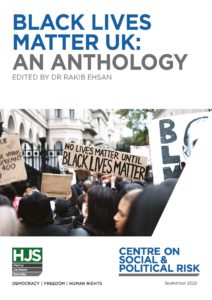 In the last few months, nobody could have missed the emergence and activities of the “Black Lives Matters” campaign, which has left its mark in the spheres of politics, education, business, sports, and entertainment.
In the last few months, nobody could have missed the emergence and activities of the “Black Lives Matters” campaign, which has left its mark in the spheres of politics, education, business, sports, and entertainment.
Claiming that right-wing authoritarianism is rising in a number of countries – including Britain – Black Lives Matters UK offers the view that bending to its demands is the only way to resolve perceived burning injustices. Its strongest critics though — some from Britain’s black communities — claim that the movement not only ignores but actively vilifies those who disagree with its policy positions.
The Henry Jackson Society’s Black Lives Matter UK anthology provides a platform for some of those voices. Its authors — who prioritise cohesion over difference — set out practical and realistic paths to improving community outcomes and healing social divisions in Britain.
Binding their contributions together is a belief that hard-left identity politics – much of which is culturally imported from the USA – threatens to weaken domestic race relations and destabilise Britain’s multi-racial democracy.
Following the Chapter 1 introduction, the contributions begin at Chapter 2 with Inaya Folarin Iman, who argues that the use of slurs like “Uncle Tom” and “racial gatekeeper” have been used by the Hard Left to shut down legitimate concerns expressed by non-white individuals over the social impact of the BLM movement in the UK.
In Chapter 3, Esther Krakue, who faced a campaign of online abuse from BLM supporters, provides a personal reflection of the effects of what she brands “silence through abuse” bullying – including experiences of hard-Left misogyny. Krakue also issues a broader warning over of the importation of divisive culture-war politics from the USA.
In Chapter 4, England Rugby Union international Courtney Lawes puts forward his argument that championing marriage and family values is the best way to drive social and economic progress within Britain’s black communities. Lawes presents the view that “a stable family unit, spearheaded by a married couple, is the finest form of social security in modern-day Britain.”
Building on this theme in Chapter 5, leading educationalist Katharine Birbalsingh argues that a so-called ‘decolonisation’ of school education prioritises narrow group-based interests over broader national inclusivity. Headmistress of the high-achieving Michaela School, Birbalsingh offers the view that a traditional historical education, centred on our national cultural heritage, is at the heart of improving social cohesion in multi-racial communities.
State school leader and educational consultant Calvin Robinson argues in Chapter 6 that Critical Race Theory and the problematic one-size-fits-all usage of the term of “BAME”, have infected mainstream thinking in English education. Robinson asserts that it is a lack of discipline and bigotry of low expectations in state schools, which is failing black pupils in England’s inner-city areas.
In Chapter 7, Konstantin Kisin writes that anti-Semitism is increasingly being normalised on the supposedly anti-racist British Left. He goes on to claim that “identity politics, such as the type peddled by hard-Left movements like BLM UK…inevitably drives different ethnic and racial groups into conflict and competition.”
In Chapter 8, University of Sheffield academic Dr Remi Adekoya turns to a body of polling to show that support for the objectives of BLM is far from being monolithic, among Britain’s “BAME” population. He goes on to say that: “Suggesting [white people] are inherent racists who should feel more or less perpetual guilt for slavery, colonialism, and all the problems black people have today is unlikely to be a winning strategy.”
The anthology’s editor, Dr Rakib Ehsan, closes the collection of contributions by arguing in Chapter 9 that while there is “much room for improvement in developing a more meritocratic society where the impact of racial discrimination is reduced, Britain remains one of the most successful examples of a post-World War II multi-racial democracy.”
Together the volume represents the most comprehensive and well-rounded critique of the Black Lives Matters manifestation in the UK to date.
READ THE REPORT HERE
“This collection of essays makes essential reading for those who are concerned over the social risks attached to the emergence of hard-Left political movements. It not only provides a concise analysis of the socially divisive nature of prevailing BLM-led narratives, but also offers guidance for politicians and policymakers who are intent on facilitating social and economic progress in Britain’s black communities.
I believe that it will serve as an important contribution to the wider debate on how to neutralise the destabilising threat of hard-Left ideology and collectively strengthen Britain’s multi-racial democratic society.”
Dr Rakib Ehsan, Research Fellow at the Henry Jackson Society


